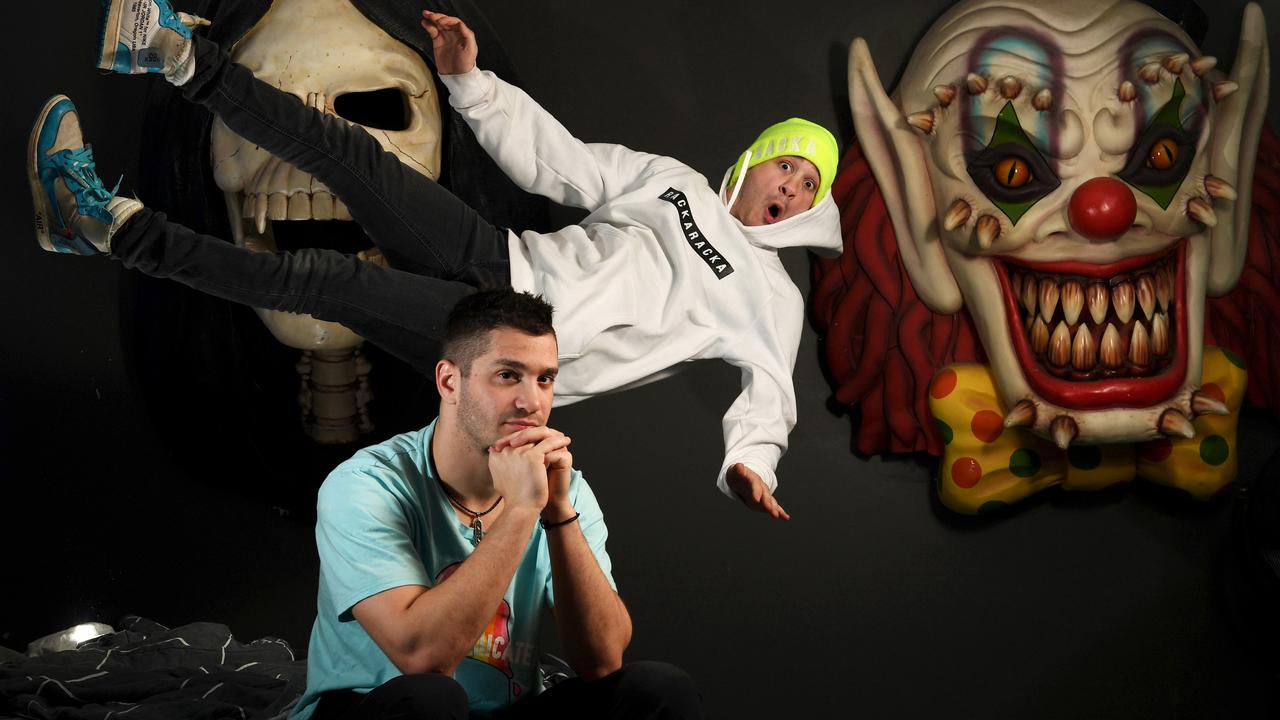The best movies with twist endings and plot twists
Movie lovers, this one’s just for you. Here’s our highly subjective list of the best twist movies. No, this list isn’t all the usual suspects. And don’t worry, we’ve hidden the endings. So it’s safe to read!
SA Weekend
Don't miss out on the headlines from SA Weekend. Followed categories will be added to My News.
A great twist in a movie can leave you stunned and breathless, desperate to watch it again.
These days, twist endings are all-too-common — but once upon a time, as many stories start, they were rare and surprising.
What makes a great twist ending? One when you didn’t even expect a twist in the first place. A great surprising ending needs to be backed up by the rest of the movie. All the clues should be lurking there.
Here are some of the best twist movies, but don’t worry if you haven’t seen them — this is safe to read. We’ve hidden the endings, so you can dodge the spoilers.
PLANET OF THE APES (1968)
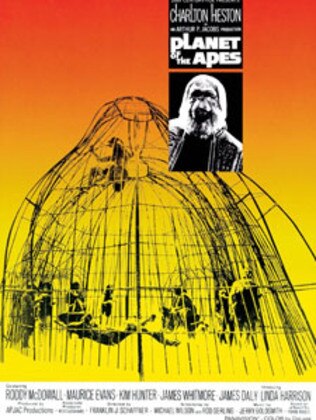
Director — Franklin J Schaffner / Writer: Michael Wilson and Rod Serling, based on the novel by Pierre Boulle
One of the original twist-ending movies, and one that now plays on that ending in its marketing (don’t look at the DVD cover. If that’s possible). Charlton Heston had some brilliant roles, but nothing like this.
THE PLOT: He’s one of three surviving space pilots who crash-land on an alien planet where intelligent apes rule in a caste system over mute, animal-like humans, who are used as slaves.
When it becomes apparent he can talk, he's treated with suspicion and fear, the apes demanding to know where he came from.
THE MOVIE: A critical and commercial success, its slow-burner start was eerie and tilted towards surrealism, especially with the nerve-wrangling music.
It ranks as one of the best sci-fi movies of all time for its groundbreaking make-up, story and set design, a bleak, unsettling and brilliant piece of filmmaking.
DID YOU KNOW? During breaks in filming, the actors playing apes naturally tended to group together in the caste system set down in the script — orangutans with orangutans, chimps with chimps.
Tap or click here for the ending
THE VANISHING — aka SPOORLOOS (1988)
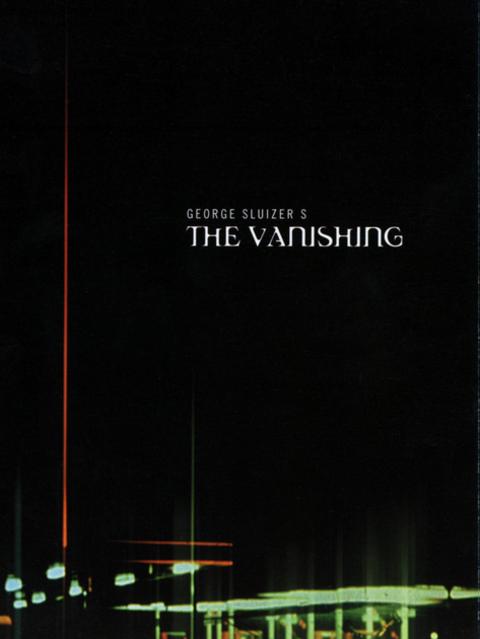
Director — George Sluizer / Writer: George Sluizer and Tim Krabbe, from Krabbe’s novel
A chilling Dutch movie (Spoorloos translates as ‘traceless’), The Vanishing is a dark film that delves into loss, mystery, and a man’s inability to let go of his girlfriend’s disappearance at a petrol station.
THE PLOT: Rex is driven by a compulsion to know what happened to his partner Saskia, and when the abductor begins to correspond with him years later, he agrees to meet him to find out. Here’s where the suspense really hits, with the victim and the manic together, with the viewer wondering where in the hell they’re going.
THE MOVIE: Going against traditional storytelling, it reveals the identity of the abductor and provides the viewer with an insight into his life, creating true suspense.
It’s a movie free of the normal Hollywood cliches (think of the car chase, the screaming woman, the knife, the bad guy outside the window) — almost clinical in its telling — but sadly, George Sluizer later directed a Hollywood remake, and the less said about that the better.
DID YOU KNOW?
Bernard-Pierre Donnadiue, who played the abductor, picked fights with his colleagues to deepen their mistrust of him.
Tap or click here for the ending
FIGHT CLUB (1999)
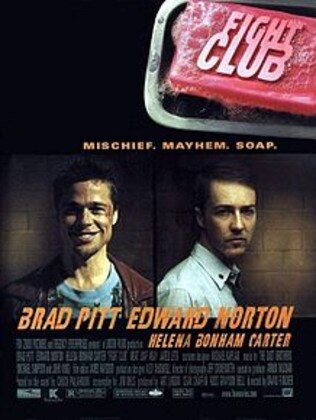
Director: David Fincher / Writer: Jim Uhls, based on the book by Chuck Palahniuk
One of the celebrities in the world of twist movies, Fight Club polarised viewers in 1999 because of its violence and dubious morality, but its ending took nearly everyone by surprise.
THE PLOT: The Narrator, a depressed insomniac addicted to support groups and disillusioned with his life, starts a fight club with soap salesman Tyler Durden — but the two begin to clash when a woman moves into their large, rambling home and Durden begins to assemble more fight clubs across the country and what appears to be a large group of followers.
THE MOVIE: It’s a biting commentary on the consumerism of modern life, isolation and loneliness, fascism — and Ikea (and who doesn’t love to have a go at Ikea).
It was dark (well, it was made by David Fincher — never a fan of light), vicious and psychological, and is now considered as one of Fincher’s best.
Fincher saw the violence as a metaphor of the conflict between consumerism and the next generation. But it’s also about people who fear vulnerability, but are still happy to lash at out others. Best of all, it blows you away at the end. Watch for one of strangest sights ever in a film — Meatloaf, with breasts.
DID YOU KNOW? Leonardo DiCaprio’s visible breath, taken from Titanic, makes a cameo appearance in the cave scene.
Tap or click here for the ending
THE USUAL SUSPECTS (1995)
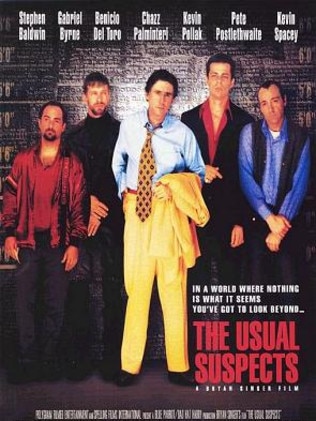
Director: Bryan Singer / Writer: Christopher McQuarrie
Look, this is a tough one. Soured by sexual assault allegations against both its director and biggest star Kevin Spacey, who plays Kint, I've included it because it's still one of those 'everywhere' kind of movies. But it's hard to watch now, given the allegations made in the past few years.
THE PLOT: An overly complicated story, snivelling snitch Verbal Kint, who has a disability, is spilling his guts to the police about an explosion at a shipyard. His story — of a group of crims who meet in a police line-up and end up being blackmailed into working for mysterious criminal mastermind Keyser Soze — is told in flashback.
THE MOVIE: Laden with red herrings and twisty, turning plot movements, the American Film Institute placed it number 10 on its list of all-time greatest mystery movies, up there beside Hitchcock.
It’s a film rich in complexity, imagery, violence and beset by fire — and, overwhelmingly, bad men doing bad things — and put Bryan Singer on the map as a director. Watch it not just for the action, but how brilliantly the script pulls everything together - if you can separate the art from the allegations against the artists.
DID YOU KNOW? Robert De Niro, Christopher Walken, Johnny Cash and Al Pacino turned it down. Pacino regretted it.
Tap or click here for the ending
THE MATRIX (1999)
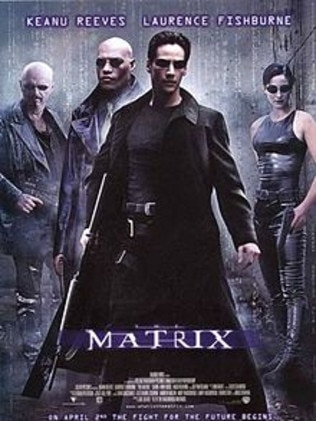
Directors and writers: The Wachowskis
It created its own special-effects terminology in Bullet Time. It mixed philosophical and religious themes with spectacular visualised action sequences (yes, it sort of stole some its ideas a bit, but made them better). Many consider The Matrix as one of the best science-fiction movies of all time.
THE PLOT: A hacker, looking for the truth online about his world, meets a mysterious man who tells him of the Matrix. He becomes embroiled in a worldwide battle for control.
THE MOVIE: A game-changer for special effects, and for modern-day sci-fi itself. It reflected the ideas-heavy sci-fi novels of the 50s and 60s, especially the ideas of Philip K. Dick, but kept it entertaining with stunning visuals. It gets a little weighed down by itself towards the end — the second half is all action, and less thought — but that action is remarkable for its effects.
The sequels began to move away from the philosophical elements and eventually veered into all-out war. Given the Keanu Reev-aissance, the story isn't over.
DID YOU KNOW: Filmed in Australia, in Fox Studios in Sydney, to keep it under budget.
Tap or click here for the ending
WITNESS FOR THE PROSECUTION (1957)
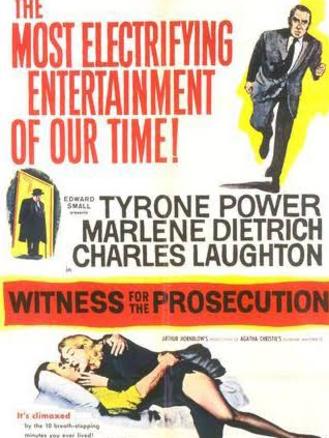
Director: Billy Wilder / Writers: Larry Marcus, Billy Wilder, Harry Kurntiz, based on the story/play by Agatha Christie
A classic in every sense of the word, it’s a bona fide suspense-filled courtroom mystery anchored by the steamy Marlene Dietrich and the brilliant Charles Laughton.
THE PLOT: Despite ill-health, top barrister Sir Wilfrid Robarts takes on the case of Leonard Vole, accused of killing a rich older widow who made him the main beneficiary of her will. Evidence points to his guilt, but Sir Wilfrid believes he’s innocent. Vole’s wife Christine — played by Dietrich — becomes a witness for the prosecution instead of trying to save her husband from the noose, confusing Sir Wilfrid.
THE MOVIE: When they say movies aren’t made like this anymore, this is what they mean — it’s a slower pace than much of Hollywood’s output today, has an overweight, ageing hero and a slightly pathetic leading man. Filmed today, it would be completely different. But in mid-50s stark black and white, it’s compelling, astonishing and vital. Wilder keeps the plot twisting, the humour on, and the cinematography artful. The acting is brilliant and the suspense in the third act is up there with some of Hitchcock’s best.
DID YOU KNOW: Tyrone Power, who played Leonard Vole, was one of Hollywood’s biggest stars at the time. This was his final movie — he died while filming his next one.
Tap or click here for the ending
MEMENTO (2000)
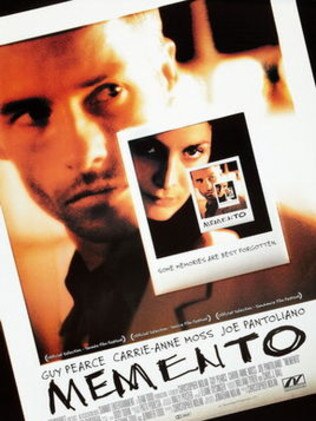
Director: Christopher Nolan / Writers: Christopher Nolan, Jonathon Nolan, based on his short story
Memento stands out because of its backwards structure, but lasts because of the acting — especially Guy Pearce in the lead role — and intricate care taken by Christopher Nolan — and the expectation placed on the audience.
THE PLOT: Leonard has anterograde amnesia, and is unable to keep recent memories. He is hunting down the murderer of his wife, and keeps the clues as tattoos on his body and polaroid photos.
THE MOVIE: It was a gimmick, but the nonlinear nature of the film works. The audience is just like Leonard, showing up in the middle of the action without any knowledge of how he got there, sharing his confusion. The film is comprised of two different structures — a briefer, black and white one that goes forwards, and the longer colour sequence that tells the story in reverse. So as the film progresses, we get the slow reveal. By the time we have a good idea about what’s really happening. we have empathy for Leonard’s confusion. Memento is not just a twisty, turning story about loss, grief and revenge, it’s a mind-bending puzzle that’s essential for repeated viewings.
DID YOU KNOW: With a little Googling and some patience, it’s possible to get some versions of the DVD to play the film in chronological order.
Tap or click here for the ending
STAR WARS EPISODE V: THE EMPIRE STRIKES BACK (1980)
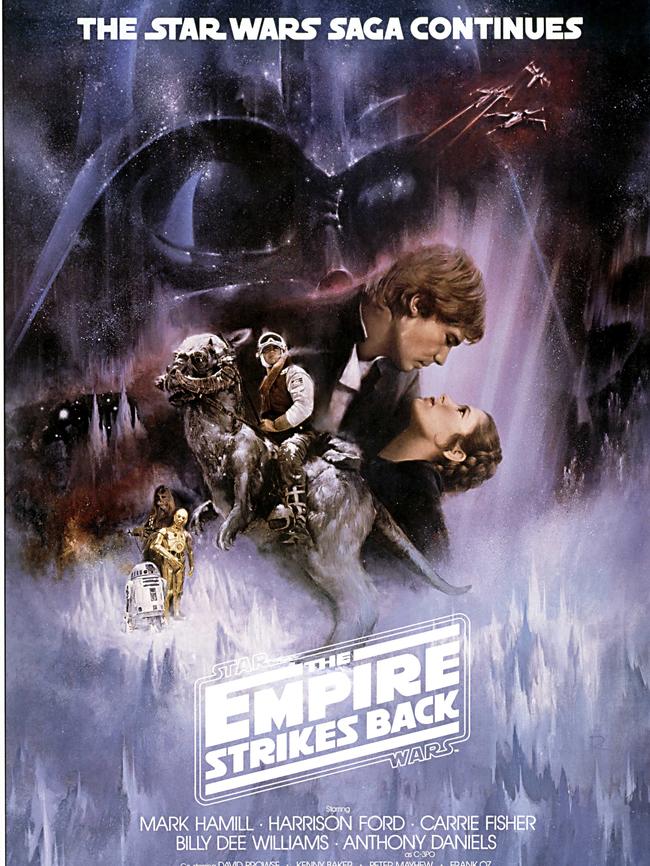
Director: Irvin Kershner / Writers: Leigh Brackett and Lawrence Kasdan, story by George Lucas
The most famous film twist of all time, Lego has made it pretty much impossible keeping it from your seven-year-old son so he can be as stunned as you were.
THE PLOT: In the sequel to the first Star Wars movie, after the Rebel base is destroyed, Luke Skywalker begins his training as a Jedi Knight but is forced to cut it short to rescue his friends — which is Darth Vader’s plan to capture him.
THE MOVIE: Darker and more mature, and considered by many to be the best of all Star Wars movies, Empire was a massive leap forward in terms of acting, set design, props, special effects, and plot development. It helped not having Lucas directing (never his strength), with Kershner able to draw more emotion from his actors, making it more about life and love than just space and shooting. Empire went further into the Jedi mythology and avoids the cliches of a big shootout at the end. It’s the one Lucas tinkered with the least when he (repeatedly) re-released it.
DID YOU KNOW: In the original theatrical version, one of the asteroids is a potato and another is a shoe. Reportedly, the SFX crew tired of requested reshoots. They’ve been removed from re-releases (the potato and the shoe, and probably the SFX crew too tbh).
Tap or click here for the ending, like you didn't already know
THE PRESTIGE(2006)
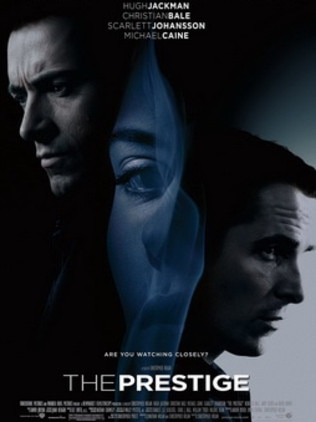
Director: Christopher Nolan / Writers: Jonathon Nolan, Christopher Nolan, based on the novel by Christopher Priest
Are you looking closely? Eminently rewatchable, and a brilliantly puzzling film that contains twist upon twist, still today the internet brims with argument over what the actual final twist really is. It seems obvious … but is it?
THE PLOT: After one causes the death of the other’s wife, two 19th-century rival magicians go head-to-head in a bitter game of sabotage. One becomes obsessed with finding out how the other pulls off his signature teleportation trick, The Transported Man — and goes to extraordinary lengths to copy it.
THE MOVIE: I'm a sucker for this movie. The number of clues, twists, and the depth at which The Prestige works is astounding. The nonlinear storyline moves forwards and backwards, but on a more epic scale than the similar Memento. The gorgeous set design contains exacting attention to detail, and as the two magicians — played by Hugh Jackman and Christian Bale — delve deeper into obsession and flawed ambition, they become both protagonist and antagonist; the viewer gets to choose who the real hero is.
DID YOU KNOW: The main characters’ initials spell ABRA — as in, abracadabra.
Tap or click here for the ending
THE SIXTH SENSE — 1999
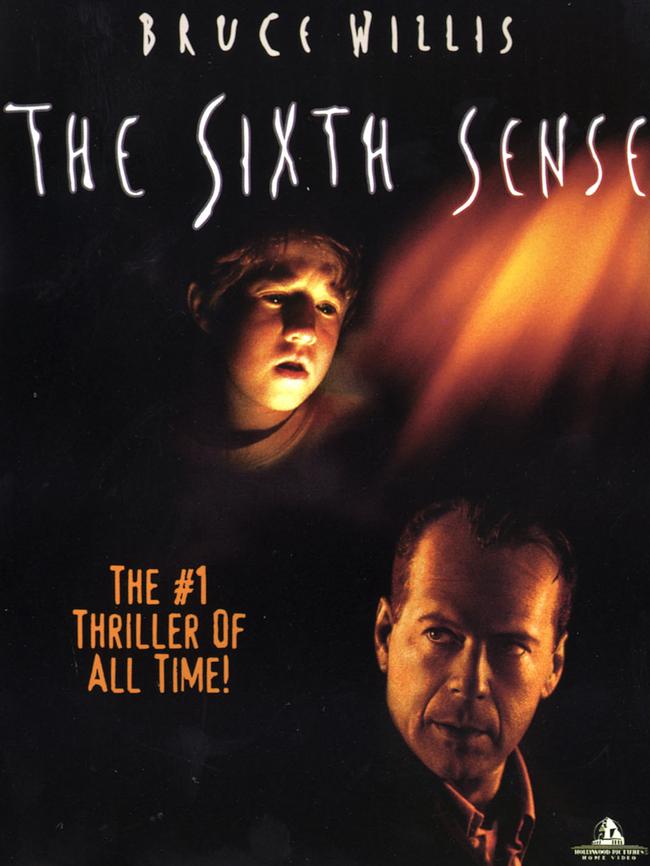
Director and writer: M. Night Shyamalan
Another of those culturally-everywhere twists, this one went a long way in kicking off the re-emergence of the twist ending but became a victim of its own success.
THE PLOT: A troubled child psychologist, played by Bruce Willis, is sent to help a boy who confides that he’s being visited by ghosts. Discovering the boy may be telling the truth, he encourages him to see if he can help them — rather than simply be a victim.
THE MOVIE: It would be uncommon, these days, for someone watching this for the first time to not know what’s going to happen (although that literally happened to my mother-in-law). And whatever you want to say about M. Night Shyamalan’s later efforts (never did a director plummet so far) his first film was gripping, suspenseful, frightening and moving as much as it was almost simplistic, even naive at times in its execution.
A ghost story that had elements of a coming-of-age film, plus horror and one giant mystery, The Sixth Sense is, these days, maligned, because of its cultural impact. That’s unfair — it’s still a mostly remarkable movie, even if Shyamalan later overdid twists, and then made terrible movies (The Happening, After Earth, I’m looking at you).
DID YOU KNOW? One of just four horror movies nominated for an Oscar (along with The Exorcist, Silence of the Lambs and Jaws).
Click here for the ending (like you don’t already know this one too)
THE CRYING GAME (1992)
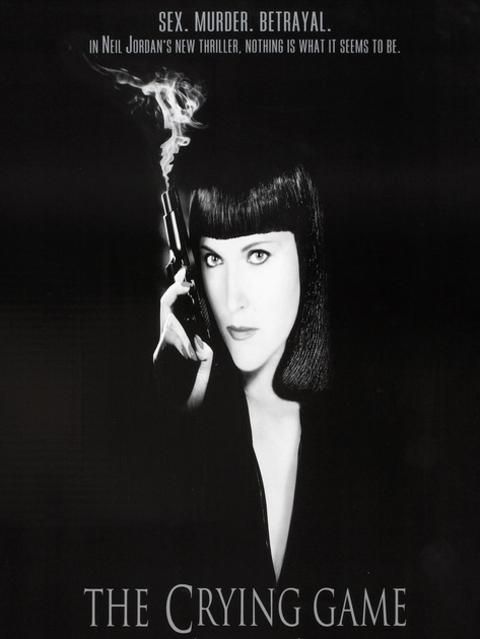
Director and writer: Neil Jordan
It gained such notoriety for its twist, but this film is far more than just its plot twist. It overshadowed the movie for much of the 90s and created unfair expectations of what the film really is.
THE PLOT: IRA member Fergus befriends Jody, the captured British soldier he’s assigned to guard — who convinces Fergus to seek out Dil, his girlfriend, should he be killed. When things go wrong, Fergus, on the run, finds Dil, and is drawn to her. But the IRA hasn’t finished with Fergus.
THE MOVIE: From the plot outline, it sounds like an action thriller, but it’s not. Yes, there’s violence, but Neil Jordan’s trick is to make it seem like a different film than what it really is. It’s a more psychological, slower-paced movie than just shooting and bombs. The viewer cares about the central characters so much that everything else is peripheral — what matters is only what happens to them. Ahead of its time in many ways, with its themes of a hidden past, guilt, and acceptance, you can argue the real twist is the change in the characters.
DID YOU KNOW: Nominated for six Academy Awards, it won one for its screenplay.
Tap or click here for the ending
SAW (2004)
Director: James Wan / Writer: Leigh Whannell/James Wan
The movie that spawned a number of increasingly ridiculous sequels and game spin-offs, the original Saw isn’t quite as gore-laden as what came after — but it comes close.
THE PLOT: Two strangers wake up chained to an abandoned bathroom with a dead body, and discover they are part of a sick and bloody game run by the serial killer known as Jigsaw — who specialises in forcing his victims to horrifically injure themselves to survive.
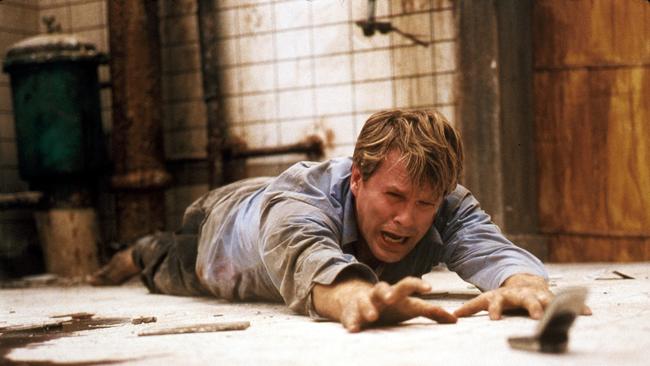
THE MOVIE: What James Wan did right was prove nasty, violent flicks can still be thoughtfully directed. With a dark, brutal atmosphere and a twisty, high-concept plot that constantly humanised its villain, Saw offered plenty of blood for those who wanted it, but never lost sight of its ultimate aim — to not just shock, but to surprise, and hold the ‘victims’ up as the true evildoers. It worked; the film led to one of the most successful and best-known horror franchises in decades, and the fans kept coming back (no matter how absurd the sequels became).
DID YOU KNOW: James Wan and Leigh Whannell, both Australians, first shot a small, particularly nasty scene to raise money for the rest of Saw.
Tap or click here for the ending
VERTIGO (1958)
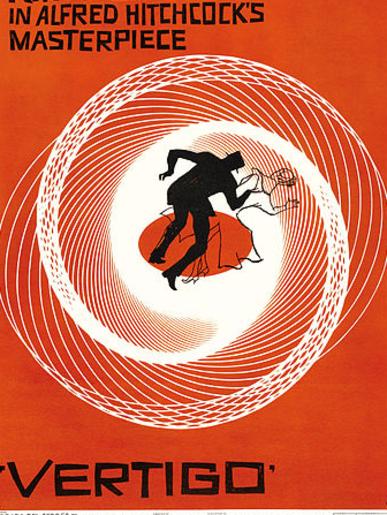
Director: Alfred Hitchcock / Writer: Alec Coppel and Samuel Taylor, based on the novel by Pierre Boileau and Thomas Narcejac
A high watermark not just for Hitchcock, but for film, Vertigo is a classic of suspense and tension. Hitchcock brings his characters’ troubled minds into frame by creating a disturbing, dreamlike atmosphere.
THE PLOT: Jimmy Stewart plays a retired police detective, Scottie, suffering from vertigo and an extreme fear of heights. He agrees to follow his friend’s wife who is behaving oddly — but becomes obsessed with her.
THE MOVIE: With its use of colour to heighten emotion, it delves deeply into themes of obsession, repetition, and mental illness. It’s not a straight mystery movie — it touches on surrealism, hinting at what David Lynch would bring to Hollywood thirty years later. It even changed filming — Vertigo was the first to use the dolly zoom (the effect where the image appears to stretch out), to replicate Scottie’s fears of heights. Vertigo’s twist comes not at the end but during the film, and for the viewer only, allowing Hitchcock to increase the tension by giving the audience more information than his protagonist.
DID YOU KOW: Initially a commercial failure, it’s now considered one of the best films of all time.
Tap or click here for the ending
SHUTTER ISLAND (2010)
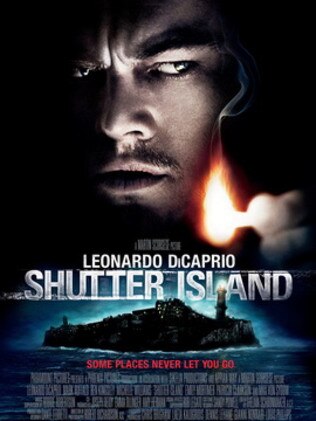
Director: Martin Scorsese / Writer: Laeta Kalogridis, based on the novel by Dennis Lehane
A stylish film-noir mystery written by one of the kings of crime writing, and directed by one of Hollywood’s greats — and it delivers.
THE PLOT: A paranoid war-veteran US Marshal, Teddy Daniels, is sent to an island to investigate the strange escape of a woman from a hospital for the criminally insane — and discovers there may be a conspiracy afoot.
THE MOVIE: Brilliantly dark, beautifully shot and with a bang-on script, Shutter Island is a near-perfect mystery. It slowly deals out a full deck of surprises, filled with flashbacks and hallucination sequences that, upon repeated viewings, make for an even better film.
But it’s heavy-going, hard to watch at times. Some of the implied violence is quite overt, and it concedes ground in the direction of horror. But Scorsese, and his lead actor, Leonardo DiCaprio, stop this film from becoming horrifying and keep it firmly psychological. It’s a movie about mental illness, and that illness pervades each scene — Scorsese uses hyper colours, rain storms, gothic set design and darkness to bring the viewer into the hospital’s mindset. And DiCaprio is completely believable as a man with a disturbed past determined to solve a mystery.
DID YOU KNOW: The only film partnership with Scorsese and DiCaprio to not receive an Academy Award nomination.
Tap or click here for the ending
THE MACHINIST (2004)
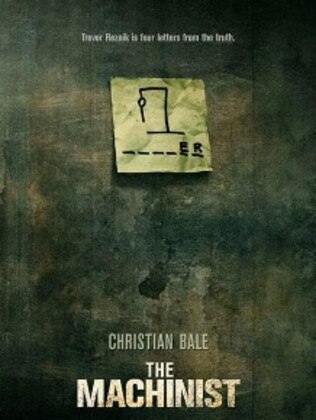
Director: Brad Anderson / Writer: Scott Kosar
A film that went under the radar for many, it’s a great find if you’ve never seen it. It’s best known for Christian Bale’s incredibly gaunt appearance — he lost 28.5kg for the role.
THE PLOT: A machinist worker suffering from insomnia, which has led to shocking weight loss, is involved in an industrial accident at work — and is followed by a stalker. It sends him into a downward spiral of paranoia and delusion.
THE MOVIE: Yes, Bale lost heaps of weight for the role, but more importantly, he acts exceptionally well. He’s nothing but his character. You watch this today, and it’s not Batman. His weight-loss probably overshadowed this great little film — a slow-paced thriller that shows a man desperately fighting against unseen forces. Shot in hues of grey and blue, The Machinist depicts a world as seen through a filter of loneliness. The reveal is an excellent piece of work as every clue become clear.
DID YOU KNOW: Bale wasn’t asked to lose that much weight — the director was shocked when he showed up on set for the first day of filming.
Tap or click here for the ending
DARK CITY (1998)
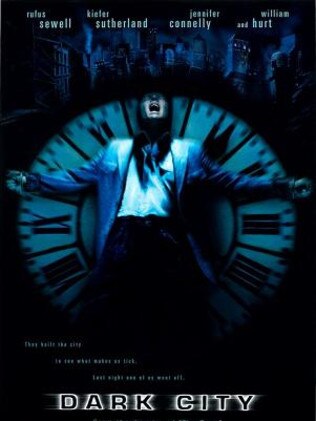
Director: Alexander Proyas / Writers: Alexander Proyas, Lem Dobbs, David S. Goyer
If you’ve never seen Dark City, do yourself a favour — turn down the sound for the first few minutes. As soon as you see Keifer Sutherland open a pocket watch, turn it up. Or just watch the Director’s Cut. You’ll get two twists instead of one.
THE PLOT: John Murdoch awakens in a hotel room with a murdered woman. He’s accused of a series of murders he can’t remember, and discovers he’s married to a woman he doesn’t know. Chased by a group of strangers through a darkened city, he teams up with a police detective to solve the mystery.
THE MOVIE: Directed by the Australian-raised filmmaker who had earlier made The Crow, Dark City is visually spectacular — even though, now, the early-days CGI now looks slightly dated. Don’t let that put you off — this flick has real kick. It’s a neo-noir action thriller that comes with surprises, action set pieces and stunning set design. Watch how the city looms above all the people and their homes; it dominates and overrules as Murdoch struggles about below, trying to regain his memory. Proyas directs on epic scale — he doesn’t go for small movies — but really, it’s a story about one man trying to escape the mechanism of life.
DID YOU KNOW: Influenced The Matrix — even some of the pieces of set were sold to The Matrix after use.
Tap or click here for the ending
SOLARIS (1972)
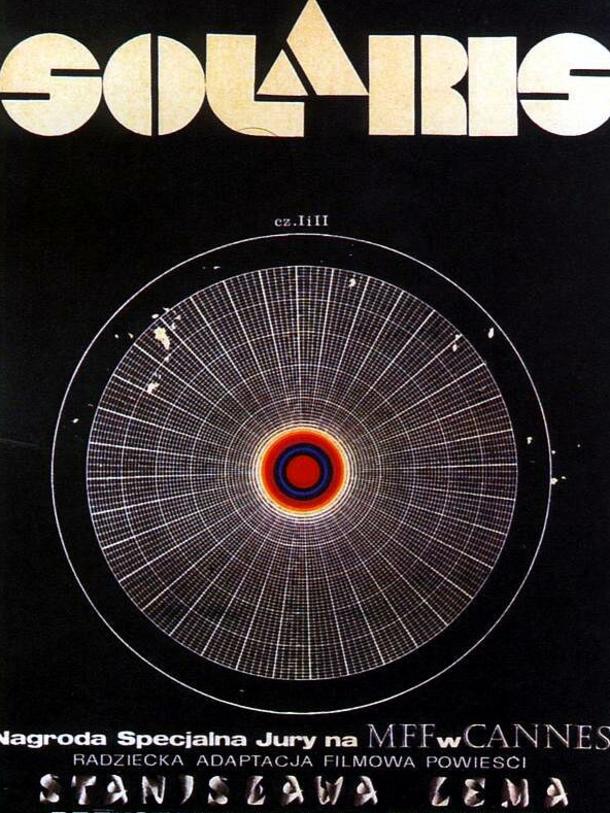
Director: Andrei Tarkovsky / Writers: Andrei Tarkovsky, Fridrikh Gorenshteyn, based on the novel by Stanislaw Lem
A landmark in not just science fiction, but in all film, by arguably the greatest director of all time, Solaris is not an action-packed movie. It is not a sci-fi flick filled with robots and fights. It is an examination of grief and loss, of fatherhood, humanity, and of personal demons.
THE PLOT: Kelvin, a psychologist goes to a space station orbiting the distant planet Solaris — which may host intelligent life — after a crew member dies and reports that the rest are going insane. His mission is to see whether the mission should be shut down or saved. Then, his deceased wife turns up.
THE MOVIE: It’s hard to encapsulate Solaris in just a few sentences. Some would find it justifiably dull. For others, it’s utterly stunning. It is work of art — all of Tarkovsky’s movies are — that delves deeper than most sci-fi. As the main character discovers the space station’s neighbour may be far more intelligent — or threatening — than he thought, Tarkovsky examines what makes us individuals, what makes us human. With a giant alien ocean beside him, Tarkovsky points expressly at our humanity and says what we have on Earth is far more important that what’s above.
DID YOU KNOW: Tarkovsky considered the film an artistic failure because it was viewed as only a science-fiction movie.
Tap or click here for the ending
PSYCHO (1960)
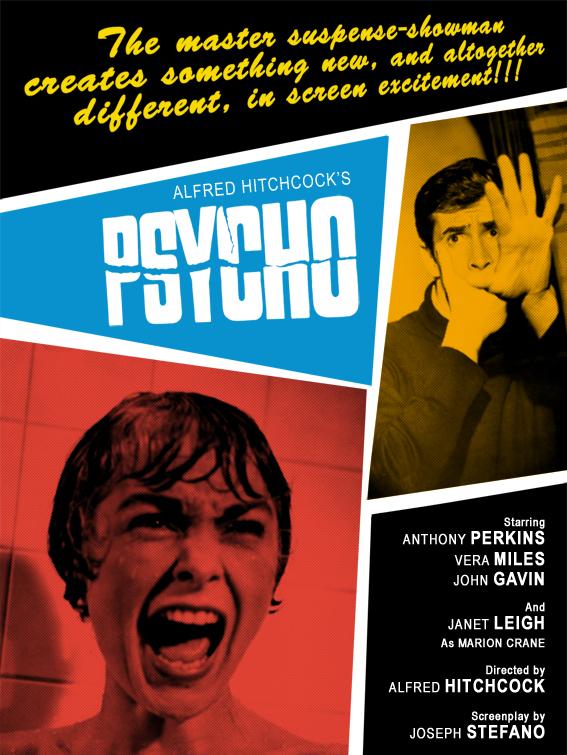
Director: Alfred Hitchcock / Writers: Joseph Stefano, based on the novel by Robert Bloch
Another of the inescapable twist endings, Psycho shocked audiences in 1960 on several levels — the flushing toilet, the shower scene, that final moment, and that Hitchcock would direct such a film at all.
THE PLOT: A young secretary steals cash from her boss, and goes on the run — checking into a motel run by an odd man dominated by his mother.
THE MOVIE: These days, Psycho doesn’t seem very violent or nasty. But back in 1960 — well, there were stunned audiences during the shower scene (which was only halfway through the movie, too). Psycho is one of the perfect movies — brilliantly acted, scripted, directed, and a complete shock. Again, it’s difficult for modern-day audiences to appreciate, but even the acting style was different — on screen, Anthony Perkins, as Norman Bates, was nothing like most actors did then. If you’ve never seen any films on the list — you should at least see this one.
DID YOU KNOW: Shot in black and white because Hitchcock noticed the low-budget black and white shocker films were raking in the cash at the box office, it allowed the props department to use chocolate sauce instead of fake blood.
Tap or click here for the ending
OLDBOY (2003)
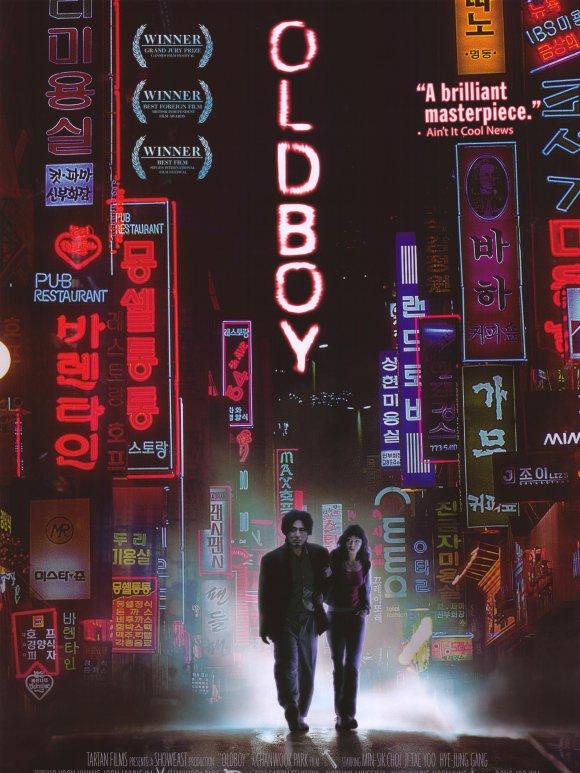
Director: Chan-wook Park / Writer: Chan-wook Park, based on the Japanese manga by Nobuaki Minegishi and Garon Tsuchiya
Don’t bother with the US remake, the original masterpiece is a searing, brutally violent, astounding, funny and horrific mystery.
THE PLOT: A man is locked in a hotel room for 15 years without knowing why, or who did it. When he’s finally released, he searches for vengeance, finding love with a chef along the way.
THE MOVIE: With its explicit sex and brutal violence, it’s not for the faint-hearted. But Oldboy isn’t just an absorbing, bloody mystery movie. On the surface it’s compulsive viewing, a film that just doesn’t let go, but underneath it’s a dark tragedy about obsession and revenge. A movie that could never be made in Hollywood (and Spike Lee’s remake toned down much of … well, everything), Korean cinema seems to go an extra length to shock. But Oldboy wasn’t made for shock value — these scenes tell a story.
DID YOU KNOW: Won the Grand Prix at Cannes in 2004.
Tap or click here for the ending
12 MONKEYS (1995)
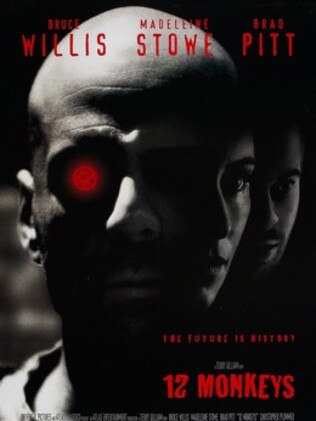
Director: Terry Gilliam / Writers: David Webb and Janet Peoples, based on the film La Jetee by Chris Marker
For those unfamiliar with Terry Gilliam, he is/was the American in Monty Python, the one that did the cartoons. This isn’t a comedy, but, like all his movies, has bleak humour at just the right time.
THE PLOT: In the future, a prisoner is sent back in time to gather information about a virus that has wiped out much of the world’s population. When he is sent to the wrong year, he’s put in a mental institution.
THE MOVIE: Don’t see this just for the twist — see it for the extraordinary vision of Terry Gilliam, a director who truly puts his mark on every film he’s made. His view of the world is chaotic, messy, hyper-colourful, startling; Gilliam doesn’t go for naturalism. He wants you to know it’s just a movie, even as he points out that his story is just a reflection of the real world. Twelve Monkeys begins as a time-travelling film but turns into a race against time as forces gather. There’s not much hope here — just a dark look at a world coming apart. Dealing with madness, memory, dreams, a man’s perception of what he thinks he can control — and even animal rights — Twelve Monkeys also has one of Brad Pitt’s and Bruce Willis’ best performances on screen.
DID YOU KNOW: Bruce Willis worked for free, and was paid after the movie — and Gilliam asked him to tone down some of the acting cliches for which he was known.
Tap or click here for the ending
OPEN YOUR EYES (1997)
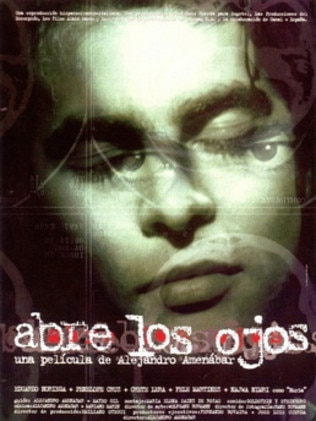
Director: Alejandro Amenábar / Writer: Alejandro Amenábar, Mateo Gil
If ever you considered watching a US remake of a foreign language film, don’t make it this one.
THE PLOT: A once-good-looking man, César, wakes up to find himself disfigured, in a mental facility, and his memories gone — all he can remember is falling in love with a woman and then a car crash.
THE MOVIE: Delivering plot twist after twist, Open Your Eyes takes the themes of reality and vanity and asks a big question — how do we really want to live? It’s a mind-bender, a film that uses technology to examine our nature, and ties everything up at the end with one big moment that makes you want to watch it again. The remake by Cameron Crowe, and starring Tom Cruise, lacked the original’s daring and vitality, and tacked on an utterly unnecessary explainer at the end. Avoid.
DID YOU KNOW: Penélope Cruz plays the same role in the original and remake.
Tap or click here for the ending
JACOB'S LADDER (1990)
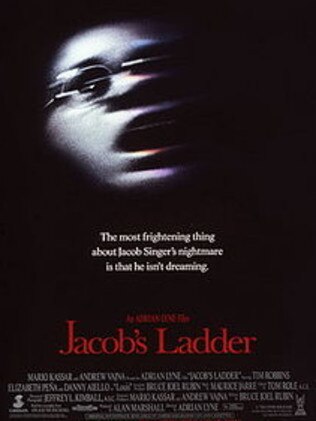
Director: Adrian Lyne / Writer: Bruce Joel Rubin
The granddaddy in terms of modern-day twist-ending films, Jacob’s Ladder is a rare thing these day — a great film that’s been somewhat forgotten.
THE PLOT: A Vietnam veteran, mourning his dead child, is struggling with post-war flashbacks and an increasingly unstable mind as the line between reality and delusion grows with paranoia. He starts to see demons — and begins to uncover a conspiracy.
THE MOVIE: It’s dressed as a supernatural thriller, with horror elements, but this is a really a human story, albeit a pretty sad one. It’s a man, already mentally damaged by war, now trying to grieve his son while maintaining his sanity. Jacob’s Ladder sucks you in — in terms of craft it’s superbly put together, and simply takes hold of you. But that ride is harrowing. The film takes you into a paranoid, deluded mind, and holds you there as that mind falls apart.
DID YOU KNOW: Tim Robbins was cast in the lead role — but 300 other actors auditioned for it.
Tap or click here for the ending
CHINATOWN (1974)
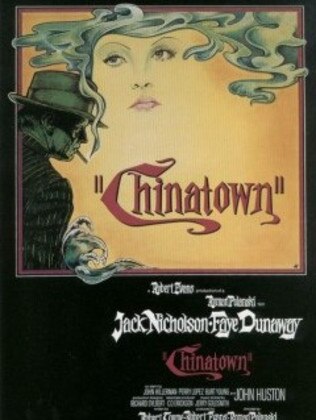
Director: Roman Polanski / Writer: Robert Towne
One of the best mystery movies of all time, Chinatown’s brilliance is that, unlike many modern-day twist movies, it doesn’t rely on its plot twist to be great. Given Polanski's guilty plea for statutory rape in 1977, however, this is another movie that makes it hard for some to watch.
THE PLOT: A private detective hired to follow a man is caught in a complex web of lies, murder, corruption and ... water and land rights.
THE MOVIE: Thirty-odd years after the glory days of film noir, Chinatown brought back the genre, influencing many of the films on this list, and countless others. The real star is not Polanski’s carefully paced direction, nor Jack Nicholson’s coiled-strength, understated performance — but the script, which is a masterclass in how to write a movie. As the mystery unravels, the viewer is brought into a complicated, dual world — one of emotional and psychological connections, while a political, environmental story sits below. The trick is that we care about both.
DID YOU KNOW: Placed as the second-greatest mystery film of all time by the American Film Institute.
Tap or click here for the ending
CITIZEN KANE (1941)
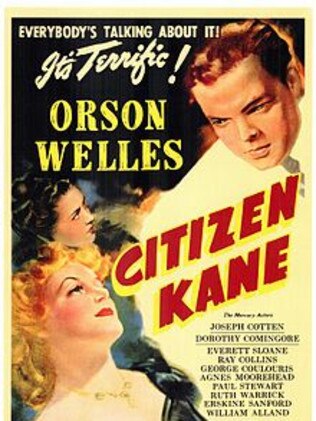
Director: Orson Welles / Writer: Orson Welles, Herman J. Mankiewicz
It’s a film about sought-after fame, celebrity and mass media and people’s perceptions of others. But it was filmed in 1941. Has much changed?
THE PLOT: As millionaire newspaper tycoon Charles Kane dies, he utters a final, mysterious phrase, setting off reporters to try to work out what he meant.
THE MOVIE: What makes Citizen Kane so great? The acting, the direction, the photography, the way Welles went against traditional filmmaking, the epic scale that depicts one man’s rise and fall, the rich script and story … but it’s also that final moment when one shot ties everything together. It’s not really a twist — it’s better than that. It puts everything you’ve seen into perspective. It’s more than the final jigsaw piece — it’s the entire meaning of a man’s life, which we come to understand completely anew. When it happens, we have to reassess all of our assumptions about Charles Kane. Citizen Kane might be about a man who achieved great things — but can’t we all, really, over the course of our entire life?
DID YOU KNOW: Welles was just 25 when he wrote, directed, produced and starred in what’s considered to be the greatest film of all time. It was a box-office flop.
Tap or click here for the ending
MULHOLLAND DR. (2001)
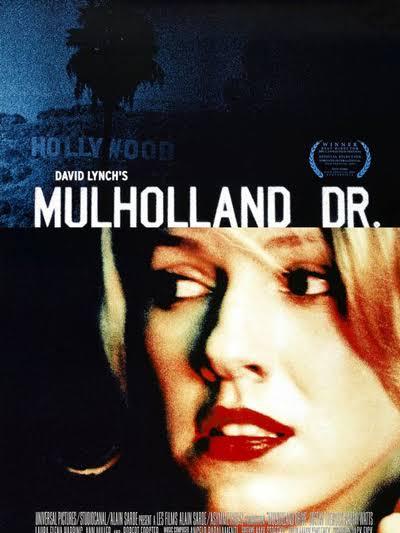
Director and writer: David Lynch
Maybe the only filmmaker capable of making red lamps creepy, David Lynch, the creator of Twin Peaks, is one of the best in the business for rabbit-hole movies (and rabbit masks) that require many, many viewings.
THE PLOT: OK, this is hard to encapsulate in a sentence, but here goes: a would-be Hollywood actress is involved in a car crash. And a conspiracy. And a murder. And amnesia. There’s a hit man. A mysterious box. Look, there's a lot.
THE MOVIE: A dreamlike, surreal journey into the poisonous underbelly of success, Hollywood and love, Mulholland Dr needs a couple of viewings, even if seems like the twist is pretty clear the first time around (it's not). Being Lynch, there’s a lot more going on. He’s often made up a bit of his films on the fly, but there is a straight story beneath all the fear and confusion. Like his other films (Lost Highway, Inland Empire) you just have to find it — everything adds up.
Intended as a pilot of a TV series, he turned it into a movie when was knocked back - so some scenes and subplots don’t initially appear to have a conclusion — instead, they add to this strange, dark world in which everyday, ordinary things are strangely terrifying.
DID YOU KNOW: David Lynch was essentially forced by his distributor to write a list of clues to understanding the film, which is included inside the DVD cover. Pay attention to the red lampshade...
Tap or click here for the ending
Other recommended movies with twists
And … bad twist movies you should avoid completely
Number 23
Basic
Law Abiding Citizen
The Forgotten
Safe Haven
Hide and Seek
Planet of The Apes (2001 version)
Perfect Stranger
Murderer (actually I take that back— this has the most absurd, ridiculous twist in the history of cinema, and if you like terrible movies it should be watched just for its sheer audacity)
Editor's Note: This list was originally published in 2015




